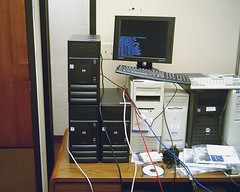PC Recommendations for Teachers
 Image by phil_g via Flickr
Image by phil_g via FlickrProcessor
Intel has been the dominant choice, but AMD has closed the gap, and often offers the same or better speed for usually less money. Within each company though, there are differently priced options. For example, as of this post, Intel's top line is its Core processor family. It also offers Pentium and Celeron families, though my recommendation would be to stay away from older and less powered groups. One of my first Dell laptops featured a Celeron and although it got me through college, it was definitely no speed demon. You can probably make a smart play on a lower number in the high end family. Our school's new Tablets feature the i5, and this came with considerable savings from the i7.
Memory
Often, the processor speed gets all the attention, but the amount of memory is so important especially in this era of multi-tasking. More memory allows users to have multiple windows open, more programs running, and a greater number of processes in action. Arguably one of the more easily upgradeable components of a PC, replacing or adding memory (often with less expensive RAM options) can be done later on, so getting the most upfront may not be worth the price. If you're not planning on any Do-It-Yourself modifications, go ahead and upgrade a few GB here.
Often, the processor speed gets all the attention, but the amount of memory is so important especially in this era of multi-tasking. More memory allows users to have multiple windows open, more programs running, and a greater number of processes in action. Arguably one of the more easily upgradeable components of a PC, replacing or adding memory (often with less expensive RAM options) can be done later on, so getting the most upfront may not be worth the price. If you're not planning on any Do-It-Yourself modifications, go ahead and upgrade a few GB here.
Hard Drive
Whereas increased amounts of memory can often get add hundreds of dollars to the computer's final price, a larger hard drive can come for much cheaper. Despite hard drives getting larger, files for videos, music, movies, photos, and more are also getting bigger, so users continue to find ways to fill up even the largest disk spaces. Similar to memory, changing a hard drive can be a fairly straight forward process, though rather than added drives like memory modules, one often has to configure a new hard drive, and this can be a bit more of a challenge for users. Thus, I'd recommend paying a little more for what usually turns out to be a lot of extra space.
Optical Drive/Graphics Cards/Monitors
Most systems will include a CD/DVD rewritable drive, but double check to make sure. Unless you're into gaming, the graphics card won't be worth upgrading, and if you already have a monitor and/or a printer, you can save some money by just purchasing the tower. If you're looking for a new monitor or printer, they'll usually be available as a bundle, or you can search for deals on these components separately.
Next up, we'll discuss how to get some deals, take a closer look at price points, and offer a few more links for the most current recommendations.
Most systems will include a CD/DVD rewritable drive, but double check to make sure. Unless you're into gaming, the graphics card won't be worth upgrading, and if you already have a monitor and/or a printer, you can save some money by just purchasing the tower. If you're looking for a new monitor or printer, they'll usually be available as a bundle, or you can search for deals on these components separately.
Next up, we'll discuss how to get some deals, take a closer look at price points, and offer a few more links for the most current recommendations.



Comments